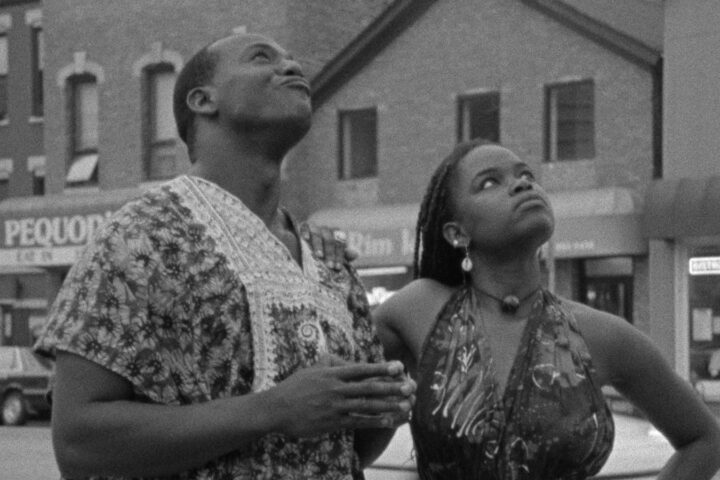“Our country is going toward the future,” booms a disembodied voice of authority as The Blue Trail begins. In this cinematic vision of Brazil imagined by screenwriter Tibério Azul and vividly realized by director Gabriel Mascaro, it’s no country for old women. An empowering narrative of one woman who refuses to see age as a ceiling, the film serves as a potent warning for viewers about the marginalization of the elderly.
The Blue Trail is a slightly off-kilter refraction of the world as it exists. Perhaps as a result, it’s all the harder to shake. In the Brazil of Mascaro’s film, the government designates its older citizens as “living heritage” and begins legal protocols to sideline them within society. Their patronization under the guise of protection includes forcing retirement, transferring custodianship to younger relatives, and the eventual scuttling off to an old age colony.
This setup amounts to more than just catastrophizing about the direction Brazil is going in. The film diagnoses the disease, not the symptoms, in order to attack a system of thought that isn’t unique to one country. The scenario here represents a frighteningly logical endpoint of productivity and optimization culture—for the way a program reduces citizens at peak working age to nothing more than their labor participation. Meanwhile, the care of the elderly becomes merely a burden on the economy that requires a solution rooted in rationality over humanity.
That creates a particular problem for 77-year-old Tereza (Denise Weinberg), who’s fallen over the age cap now that it’s been lowered from 80 to 75. This longtime factory worker refuses to accept Brazil’s hypocritical lionization of her advanced years. She feels that she still has plenty to give to the world, and there also remains plenty that she wishes to take from it. The state stifles every step she takes to feel some semblance of independence, culminating in the refusal of her ability to book travel without the permission of her daughter, Joana (Clarissa Pinheiro).
Rather than face the dreaded “wrinkle wagon”—a buggy that transports senior citizens to their segregated spaces—Tereza sets out on a renegade mission down the Amazon to whet her appetite for freedom and discovery. Her picaresque journey across The Blue Trail contains as many twists and turns as the river itself, with surprising encounters and experiences always waiting just around the next bend. It’s a structure that befits the character’s hopefulness and resilience—that senescence need not be treated as a time of scarcity.
Weinberg imbues Tereza with vigor, vitality, and vulnerability that makes each plot development delightful to navigate alongside her character. While her stated goal is to finally fly in a plane, the real mission is demonstrating to herself and others that no one can control her ambitions. She’s stubborn and self-assured in a larger-than-life way, yet she’s still a tether to a more recognizable iteration of reality. That makes a difference, as the carousel of characters helping her reach the final destination gets a bit kooky, including the smuggling boat captain Cadu (Rodrigo Santoro) and the atheistic huckster Roberta (Miriam Socarrás).
Some of The Blue Trail’s fantasy elements, such as Cadu’s snail secreting a hallucinogenic blue slime and Roberta’s digital Bible, veer toward the twee. Mascaro’s film is much more confident when dwelling in the mundanity of its alternate vision of Brazil rather than its mysticism, hinting at societal turmoil. Details such as graffiti reading “GIVE ME BACK MY GRANDPA” scrawled across a wall that Tereza ambles past is as evocative as it is provocative.
It’s remarkable how much Mascaro packs into the slender 86-minute runtime of The Blue Trail. Short though the film may be, Tereza’s wandering voyage feels substantial and satisfying. This tale of quiet triumph knows that the best counterweight to the market’s invisible hand is to offer a caring hand into the dreams of those it leaves behind. The film’s pleasures and possibilities feel as boundless as Tereza’s hopes for what lies ahead. Mascaro compassionately exhibits how a future that doesn’t make space for its past is not one worth venturing toward.
Since 2001, we've brought you uncompromising, candid takes on the world of film, music, television, video games, theater, and more. Independently owned and operated publications like Slant have been hit hard in recent years, but we’re committed to keeping our content free and accessible—meaning no paywalls or fees.
If you like what we do, please consider subscribing to our Patreon or making a donation.





